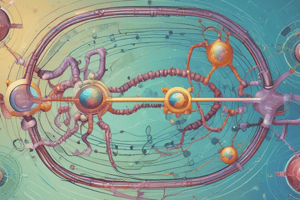Podcast
Questions and Answers
What year did the scientists receive the Nobel Prize in Chemistry for the discovery of ubiquitin-mediated protein degradation?
What year did the scientists receive the Nobel Prize in Chemistry for the discovery of ubiquitin-mediated protein degradation?
- 2004 (correct)
- 2007
- 2001
- 2010
Which of the following proteins is specifically referred to as M cyclin in the context of the M phase?
Which of the following proteins is specifically referred to as M cyclin in the context of the M phase?
- Cyclin A
- Cyclin B (correct)
- Cyclin E
- Cyclin D
What role does ubiquitination primarily serve in cellular processes?
What role does ubiquitination primarily serve in cellular processes?
- Facilitating protein synthesis
- Regulating protein degradation (correct)
- Enhancing signal transduction
- Promoting cell division
Which aspect of proteins can vary significantly due to ubiquitination?
Which aspect of proteins can vary significantly due to ubiquitination?
Ubiquitination has a similar regulatory role to which other post-translational modification?
Ubiquitination has a similar regulatory role to which other post-translational modification?
How is the degradation of cyclins primarily classified in cellular processes?
How is the degradation of cyclins primarily classified in cellular processes?
What role does the M-Cdk complex play during the M phase of the cell cycle?
What role does the M-Cdk complex play during the M phase of the cell cycle?
How is the M-Cdk complex activated at the onset of mitosis?
How is the M-Cdk complex activated at the onset of mitosis?
Which molecule is responsible for keeping the M-Cdk complex in an inactive state?
Which molecule is responsible for keeping the M-Cdk complex in an inactive state?
What happens to M cyclin levels during the G2 and M phases of the cell cycle?
What happens to M cyclin levels during the G2 and M phases of the cell cycle?
What structural changes facilitative role do cohesins and condensins provide during mitosis?
What structural changes facilitative role do cohesins and condensins provide during mitosis?
Which of the following statements about the phosphorylation of the M-Cdk complex is true?
Which of the following statements about the phosphorylation of the M-Cdk complex is true?
What is the relationship between the M-Cdk complex and the Cdc25 phosphatase?
What is the relationship between the M-Cdk complex and the Cdc25 phosphatase?
What role does cohesin play during mitosis?
What role does cohesin play during mitosis?
Which statement accurately describes condensin's function?
Which statement accurately describes condensin's function?
What happens to cohesin as the cell progresses through mitosis?
What happens to cohesin as the cell progresses through mitosis?
Which component is essential for the physical separation of daughter cells during cytokinesis?
Which component is essential for the physical separation of daughter cells during cytokinesis?
What is the primary characteristic of M phase?
What is the primary characteristic of M phase?
How are condensins and cohesins structurally similar?
How are condensins and cohesins structurally similar?
What is the function of the mitotic spindle during cell division?
What is the function of the mitotic spindle during cell division?
In the S phase of the cell cycle, what is primarily occurring with regard to chromosomal structure?
In the S phase of the cell cycle, what is primarily occurring with regard to chromosomal structure?
What experimental technique was used to visualize the distribution of condensin along chromosomes?
What experimental technique was used to visualize the distribution of condensin along chromosomes?
What is the role of kinesins during mitotic spindle assembly?
What is the role of kinesins during mitotic spindle assembly?
Which statement best describes the function of the M-Cdk complex?
Which statement best describes the function of the M-Cdk complex?
How does the presence of Ran-GTPase affect microtubule dynamics during mitosis?
How does the presence of Ran-GTPase affect microtubule dynamics during mitosis?
What major event happens to the nuclear envelope during mitosis?
What major event happens to the nuclear envelope during mitosis?
What is a significant characteristic of microtubules during metaphase?
What is a significant characteristic of microtubules during metaphase?
Which protein complex is crucial for the extensive condensation of mitotic chromosomes?
Which protein complex is crucial for the extensive condensation of mitotic chromosomes?
What effect does M-Cdk phosphorylation have on centrosome components?
What effect does M-Cdk phosphorylation have on centrosome components?
What is the primary outcome of increased microtubule instability during mitosis?
What is the primary outcome of increased microtubule instability during mitosis?
What is the primary function of kinetochore microtubules during mitosis?
What is the primary function of kinetochore microtubules during mitosis?
Which type of microtubules plays a key role in separating sister chromatids during anaphase?
Which type of microtubules plays a key role in separating sister chromatids during anaphase?
How does the duplication of centrosomes relate to DNA duplication in the cell cycle?
How does the duplication of centrosomes relate to DNA duplication in the cell cycle?
Which motor protein is responsible for the anti-parallel sliding of interpolar microtubules during spindle elongation?
Which motor protein is responsible for the anti-parallel sliding of interpolar microtubules during spindle elongation?
What is the orientation of the plus-ends of all microtubules during mitosis?
What is the orientation of the plus-ends of all microtubules during mitosis?
What is a unique feature of dynein motor proteins compared to kinesins?
What is a unique feature of dynein motor proteins compared to kinesins?
How do interpolar microtubules contribute to the overall function of the mitotic spindle?
How do interpolar microtubules contribute to the overall function of the mitotic spindle?
What mechanism is shared by both DNA duplication and centriole duplication?
What mechanism is shared by both DNA duplication and centriole duplication?
What role do kinesin 14 motor proteins play during mitosis?
What role do kinesin 14 motor proteins play during mitosis?
What is the consequence of improper segregation of sister chromatids during mitosis?
What is the consequence of improper segregation of sister chromatids during mitosis?
Flashcards are hidden until you start studying
Study Notes
Discovery of Ubiquitin
- Nobel Prize in Chemistry awarded in 2004 for the discovery of ubiquitin-mediated protein degradation.
- Ubiquitination is a critical post-translational modification involved in the turnover of proteins, including cyclins.
- Proteins have varying half-lives: some last 24 hours, while others degrade within minutes.
- This process is crucial for regulating protein levels and cell cycle progression.
M-Cyclin CDK Complex
- M cyclin, specifically cyclin B, forms the M cyclin CDK complex with CDK1.
- Regulates entry into and exit from the M phase of the cell cycle, essential for mitosis.
- M-Cdk induces mitotic spindle assembly and chromosome attachment to the spindle.
- Activates chromosome condensation and nuclear envelope breakdown.
Activation and Regulation of M-Cdk
- M cyclin accumulates during the cell cycle, particularly in G2 and M phases.
- Ubiquitination influences the stability and degradation of M cyclin; decreased ubiquitination allows accumulation.
- Activation requires dephosphorylation: inhibitory phosphate groups added by Wee1 kinase must be removed by Cdc25 phosphatase.
- The M-Cdk complex exhibits a positive feedback loop, facilitating rapid progression into mitosis.
Cohesins and Condensins
- Cohesins form rings that hold sister chromatids together until anaphase.
- Condensins aid in DNA condensation, forming loops that compact chromatin into metaphase chromosomes.
- Both proteins work together to ensure proper chromosome organization during mitosis.
Cytoskeletal Structures in M Phase
- The mitotic spindle, composed of microtubules, is essential for chromosome segregation.
- Actin filaments form a contractile ring during cytokinesis for daughter cell separation.
- Cytokinesis follows mitosis, facilitating the division of cytoplasm into two cells.
Microtubules in M Phase
- Kinetochore microtubules attach to the centromeres of chromosomes, facilitating their movement during mitosis.
- Interpolar microtubules stabilize the spindle and aid in separating sister chromatids.
- Astral microtubules help position the spindle apparatus within the cell.
Centrosome Duplication
- Centrosomes duplicate alongside DNA during interphase to prepare for mitosis.
- Centrioles duplicate in a semi-conservative manner, serving as templates for new centrioles.
- This duplication is crucial for maintaining proper cell structure and function during cell division.
Role of Motor Proteins
- Motor proteins, like kinesins and dyneins, facilitate microtubule dynamics and chromosome movement.
- Kinesins move toward the plus-end of microtubules, promoting elongation and alignment of chromosomes.
- Dyneins move toward the minus-end, contributing to microtubule organization and centrosome separation.
- Proper function of these motor proteins is vital for accurate chromosome segregation and cytokinesis.### Kinesin Movement and Motor Protein Functions
- Kinesin 5 exhibits bidirectional movement on microtubules, with motor domains enabling movement toward both minus and plus ends.
- Reciprocal sliding between antiparallel microtubules occurs due to the action of multimeric motor proteins, essential for mitotic spindle assembly.
- Two primary functions of these motor proteins include promoting microtubule sliding toward spindle poles and facilitating microtubule focalization at the centrosome.
Role of Cyclin-CDK Complex in Mitosis
- Cyclin-CDK complex (M-Cdk) is crucial for bipolar mitotic spindle assembly, phosphorylating proteins including condensins and lamins.
- Condensins facilitate the condensation of chromosomes, while lamin phosphorylation leads to nuclear envelope breakdown during mitosis.
- M-Cdk influences microtubule dynamics and centrosome maturation, ensuring accurate chromosome separation.
Microtubule Instability and Dynamics
- Microtubule instability increases during mitosis, crucial for the formation of the mitotic spindle and interaction with chromosomes.
- Metaphase microtubules have a half-life of 15 seconds compared to 5 minutes in interphase, showing reduced dynamic instability when attached to kinetochores.
- Interpolar, kinetochore, and astral microtubules display different stability characteristics and functions during mitosis.
Chromosome Contribution to Microtubule Nucleation
- Ran-GTPase protein accumulates around mitotic chromosomes, aiding microtubule attachment to kinetochores.
- Activated by GEF (RCC1), Ran promotes the exchange of GDP for GTP, enhancing nucleation and microtubule attachment at kinetochores.
- Chromosomes serve as nucleation points for microtubule formation even in the absence of centrosomes.
Mechanism of Microtubule Nucleation
- Nucleation occurs at the centromeric region, with active Ran GTP promoting recruitment of proteins essential for microtubule assembly.
- Microtubules elongate toward the plus end and stabilize at kinetochores, facilitating proper chromosome alignment and segregation.
- The process is governed by concentration gradients of Ran-GTP, displaying differences in microtubule behavior depending on their origin.
Kinetochore Structure and Function
- Kinetochore microtubules bind to the centromere region of chromosomal proteins, forming during chromosome condensation.
- Variability exists among species regarding the number of microtubules attached to kinetochores, with simpler organisms exhibiting fewer attachments.
- Kinetochore evolution reflects diversity in protein complexes, influencing the functionality and efficiency during cell division.
Studying That Suits You
Use AI to generate personalized quizzes and flashcards to suit your learning preferences.




